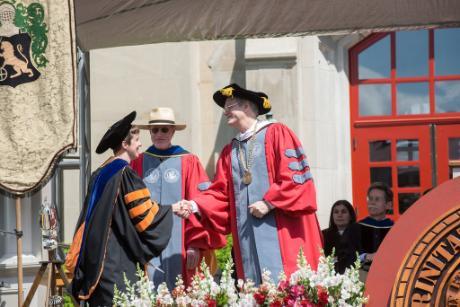Dr. Hark's Page
| Dr. Amy T. Hark Professor of Biology Co-Director of Biochemistry |
||
|
Office: 225 New Science Building Hark CV 2023 |

Dr. Hark receiving Empie Award at graduation (2014) |
Biology Department |
Education
B.S., Biology, College of William and Mary, 1994
M.A., Molecular Biology, Princeton University, 1997
Ph.D., Molecular Biology, Princeton University, 2000
Postdoctoral Research, Biochemistry and Molecular Biology, Michigan State University, 2001-2004
Courses
BIO 118 Concepts of Biology: Genes, Genomics, and Society
In this course, we will study the biology and technology surrounding our DNA. We will explore how our changing understanding of genetics and availability of biotechnology shapes our view of the human condition. Ultimately, we will ask questions about the potential of our genome to define who we are. We will also consider the process of science and its role in our lives and society, in alignment with the goals of the SC general academic requirement. When listed as BIO 119, this course is linked to REL 105 Sex, Gender, and Religion taught by Prof. Sharon Albert. Successful completion of both courses satisfies the Integrative Learning (IL) requirement.
BIO 175 From Organisms to Molecules
A disciplinary introduction to the study of cells and macromolecules as it informs on the mechanisms of life. Students will apply core evolutionary and genetic principles to understand how information is stored, transmitted, and decoded in living cells. Students will learn how molecular pathways control gene expression, intercellular and environmental communication, and metabolism. The study of cellular systems informs on both larger organismal mechanisms including development and physiology and structure-function relationships at the molecular level.
BIO 220 Biochemistry
Biochemistry represents the study of organisms, cells, and cellular components at the chemical and molecular level. In this intermediate-level course we will consider the structure and function of both nucleic acids and proteins, including an introduction to enzyme kinetics and regulation. We will also review carbohydrates and lipids and discuss aspects of metabolism and signal transduction.
This course is intended for science majors who have had an introduction to general and organic chemistry as well as introductory biology (including, but not limited to, topics in genetics and cell biology). It is designed to be of interest to those students who may pursue scientific research as well as those interested in a career in the health professions. Many of the topics discussed and examples used will relate to human health and disease.
BIO 472 Genomes and Gene Evolution (GGE)
A central question that remains in biology is to understand the relationship between changes at the DNA level and evolution of organismal form and function. This capstone course connects to that question with a focus on modern comparative and regulatory genomics. The class emphasizes bioinformatic approaches in genomic science and includes review of primary literature in addition to novel data analysis. Discussions and writing assignments will be centered on student projects in distinct areas of genomics.
Research
My scientific research interests involve studying the regulation of gene function: how are genes controlled so that they are active only in the appropriate types of cells and developmental stages? In particular, I am interested in how factors such as packaging and modification of DNA into chromatin and genome organization may affect gene expression in eukaryotic organisms.
In our "wet-lab" research, we most commonly use the plant Arabidopsis thaliana as an experimental model to explore gene regulation in the context of its effects on development. My research investigates the biological roles of proteins known to covalently modify chromatin structure, including the histone acetyltransferase GCN5 and the associated transcriptional activator ADA2b. Disruption of these genes' functions results in dramatic effects on plant growth and development. On-going research investigating the function of these genes in plants will be carried out using a variety of approaches, allowing students to develop projects in the areas of molecular biology, genetics, and developmental biology.
Students in my lab are also engaged in comparative genomics projects that uses in silico (computer-based) analysis to annotate genes in Drosophila species (defining their start/stop sites, exon/intron boundaries, etc.). This work is a collaborative effort of the Genomics Education Partnership (GEP) and is supported by the National Institutes of Health and the National Science Foundation. Most of our work is currently within the Pathways Project, looking at the underlying biological question of how gene regulatory networks evolve.
For more information, please see the https://www.muhlenberg.edu/academics/biology/facultystaff/amyhark/drharkspage/theharklabresearchpage/.
Page last updated December 2023.

